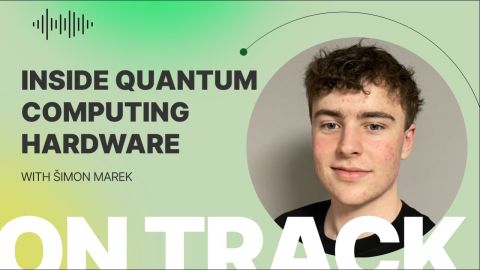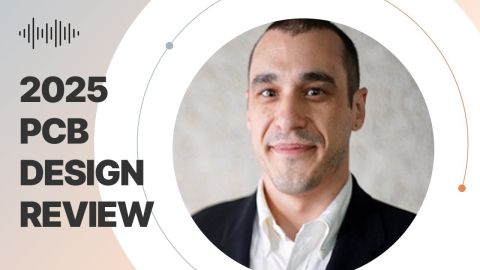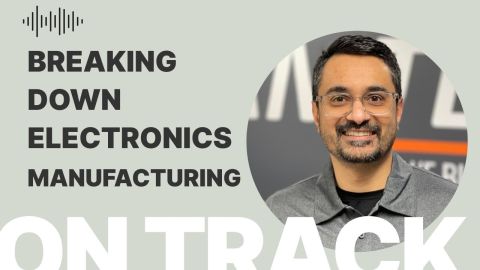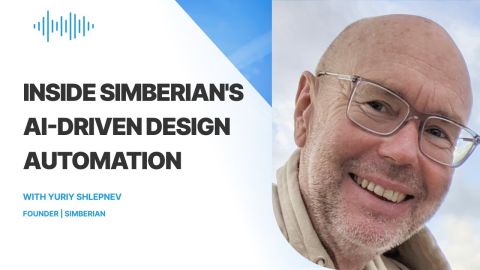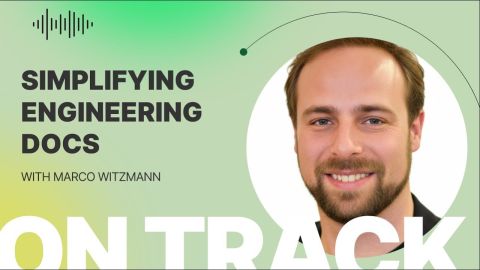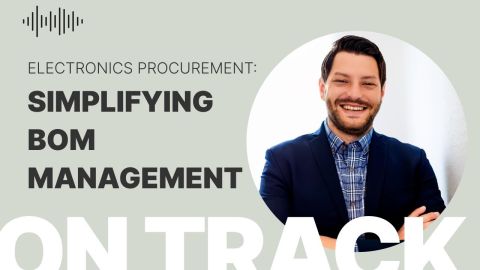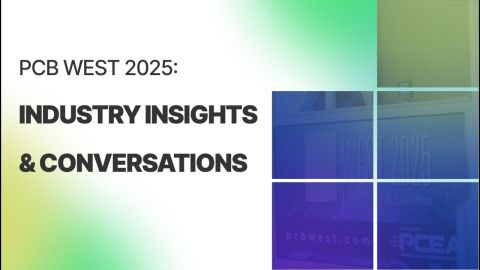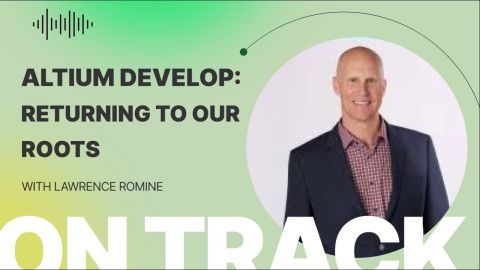Stephen Chavez Calls on PCB Designers to Get Involved

Professional Development (self-directed)
-
IPC APEX, San Diego - manufacturing perspective, fabricators, if you don’t have time to get into a board shop this is the place to be, machines are running live
-
PCB West - pure design for PCB designers; content is second to none
-
DesignCon
-
Del Mar Electronics and Design Show
-
PCB Carolinas (1,000 people/ 1 day conference)
-
AltiumLive Munich - learn more or register today
-
IPC Designers Council, etc.
-
CID Training
-
Reading--Trade magazines - UP Media (Printed Circuit Design & Fab and Circuit Assembly) and 007 iConnect - the articles and content in these magazines are the best.
Get Involved!
-
Ask around (for resources, help, mentors)
-
Take Risks and take initiative--spend money, assert yourself
-
Serve/Volunteer
-
Networking/Relationship building
Live part of everyday outside of your comfort zone
-
Don’t be afraid to ask questions--others have the same questions and dont ask!
-
Expand your network, meet people
-
My network comes with me in every new relationship I build
-
Add value to others
-
Don’t sit on the sidelines
Links and Resources:
The Digital Route, November 2018 Column
Breaking the Design Data Bottleneck, interview in iConnect007
AltiumLive Munich - learn more or register today
Altium Designer 19 - learn more or call your account manager to learn more
Trade In Your Outdated PCB Design Tool & Unlock 45% OFF Altium today!
Click here to view all Episodes
Or click here to access the Altium Free Trial Today.
Transcript:
Judy Warner:
Hi everybody. It's Judy. We're about to speak with Steven Chavez, who's a leader at a military aerospace company. He's a former marine as well as a CID and CID+ instructor and an executive board member of the IPC Designers’ Counsel. Whether you're starting out in your career or you’re an advanced pro, you're going to love this conversation and get great takeaways.
Judy Warner:
If you're new to the industry, you'll find tips about where to find training. If you've been at it a while, Steph will challenge you to take it up a notch. Get connected, step out of your comfort zone and pay it forward. So listen, and I hope you'll enjoy. Welcome to Altium's OnTrack Podcast where we talk to leaders about PCB design, tackling subjects ranging from schematic capture all the way to the manufacturing floor.
I'm your host, Judy warner. Please listen in every week and subscribe on iTunes, Stitcher and all your favorite podcast aps. And be sure to check out the show notes at Altium.com/Podcast where you can find great resources and multiple ways to connect with us on social media.
Judy Warner:
Hi Steph. It's good to see your face. Thanks so much for joining. Can't wait to hear what you have to share with us today.
Stephan Chavez:
Awesome. It's nice to be here with you. I'm very excited about this. Thanks for having me.
Judy Warner:
Yeah, my pleasure. So why don't you start out and give our audience just an introduction about you and your background as a designer and a Design Manager?
Stephan Chavez:
Okay, so my background as a designer and where I'm at in my role with IPC: I'm a senior level designer.
I work for a large aerospace company, one of the largest, if not the largest aerospace company. I lead a team in Phoenix, Arizona, as well as a team in Bangla India and I’m part of the community of practice there.
My biggest role that I have globally, though, is the Executive Board Member for the IPC council. The Designer’s Council Executive Board. I now am Communications Officer for a new role in the digital layout. The column that we’re starting to do with I-Connect Magazine and the digital route with UP Media and I'm very excited about that. We just launched it, and it's having me outside of my box because I normally - that's out of my role, but it's very exciting. And anything that has to do with PCB design, fabrication, assembly, that's my passion and my background. I started as an Avionics Technician in the Marine Corps and evolved from there as my career progressed, I evolved into a PCB Designer, and it's been like twenty years now. I'm now an instructor, and advanced instructor who teaches CID and CID+ for IPC, and for EPTAC, and I fly around, and I'm very blessed to meet amazing designers that are hungry for knowledge and they’ve got a passion, too. So other people have the knack like I do.
Judy Warner:
So, yes, you are among friends here on the the OnTrack Podcast. So how I came to know Steph back in my PCB and EMS days was, I actually called on Steph at that large aerospace company that he's talking about and we became friends. And then we connected through the IPC design forum, where he was a speaker there, and that's how we became connected a few years ago and have since become dear friends, and I've come to really respect all the ways that he is giving back to designers.
Judy Warner:
So I wanted to have you jump in here, Steph, and talk about maybe three or four pieces of advice you would give to designers, no matter what stage of their career that they're in, of ways that they can proactively advance their career because I think you have a lot of wisdom on the subject.
Judy Warner:
So let's start out. I think the first one you had mentioned to me was around professional development, which I know is a subject you're passionate about.
Stephan Chavez:
Exactly. I think when it comes to your career and your evolution, it's nobody else's responsibility except for your own and you, you as an individual have to ask yourself, where do you want to be and how do you want to evolve? And continuous education, and with all the courses that are out there regarding the industry - conferences, seminars, expos. You have individuals such as Rick Hartley or Lee Ritchey that are giving classes, Happy Holden, they’re talking at these seminars.
It's just amazing. And to get involved and to get this knowledge, it's out there and it's up to you. And it’s up to each individual what they want to do, where they want to be and how they want to apply what they gain to progress their career.
And and I'm very passionate about continuous improvement and continuous education, because major universities don't have a curriculum for PCB Design, and the only way you're gonna get it, in a full spectrum, is to actually attend these conferences. So, as well as I’ll even say, AltiumLive this year. The buzz I heard and the feedback, unfortunately, I was teaching a CID class at Micron. But at that time, the feedback I got was just amazing. And the content I had seen from it was, you know, I'm very excited and I'm hoping that next year in my schedule, I have a gap to where I can attend it. So it's amazing with what's happening in the industry.
Judy Warner:
What I like, thank you so much by the way, by saying that and telling us, about the things that you heard. What I love about this for our listeners, is Steph is not an Altium Designer user, so I kind of love that he appreciates what we've tried to do here, which is not only talk about our tool, but just feed the design community ways to just be a better designer, whether you use our tools or not. So, I love that. Thank you.
Stephan Chavez:
You’re welcome.
Judy Warner:
So, I know for sure you would say CID training, right?
Stephan Chavez:
Exactly - the CID and the CID+ certification, in my opinion, those are the stepping stones you need to evolve into a truly solid, good designer. I would say great, but you know, every designer is unique, and everyone's different, every design can be done in different ways, and it's a whole collection of being able to do it under pressure, on time, on schedule. And the bottom line is, you want to apply the three successful traits of the design or what we call - or what I refer to - as the designer’s triangle. You want to make revision one work, and you want to get it right the first time. It's regarding the layout solvability, it's performance with RNPI and SI, which is your signal integrity, power integrity and then your DFM. You know, manufacturable, is the first one. Can it function the same way and can be produced the same as if it's the thousandth one? So, those key factors are what, when you’re solidifying, you’re honing your skills, and you're able to do that every time - you truly have pinnacled, have reached your design success and that's key.
Judy Warner:
You know, in regards to CID. It may be knowledge, but it wasn't that many years ago that I came to understand, that CID really helps designers, not just be practitioners of designing or routing per sé. It helps them tie together designing in a way that does make a manufacturable board, in context of manufacturing both the bare board level and the assembly level. So, it's really cohesive, and you still need to learn great routing practices or something and I always thought it was like a techniques thing, and I was off.
Stephan Chavez:
The bottom line is that the CID certification is the foundation. It is like learning the alphabets for speaking English. You've gotta learn the foundation. You gotta lay a solid foundation down first. And that's what the CID Course does and the certification class does is, is to solidify your skills as a designer that you know at a minimum of the industry standard, to talk the same language from design to fabrication to assembling. And you are able to talk intelligently and comprehend and totally understand the process of what that board is going to go through and all the details that go into it. And it's amazing, you'd be surprised how many designers or engineers - EEs, have not been to a fabrication shop, and when they go there for the first time, they're blown away on the amount of details that go into it. And all the little nuances and potential for escapes or, what I would say prayers. But, yeah, it's the CID class does that. It solidifies that you know, ‘at a minimum’ of industry standard knowledge, to be able to start the foundation of being a designer.
Then you advance into the advanced course where you're now going to get into what Mike Creeden likes to refer to as ‘the little sparky's,’ and I love that about mike. Mike is phenomenal. I can't say enough about Mike, but that's a whole nother topic. But the CID+ course is where you get into honing your skills at a more advanced level, you get into more details regarding your stack ups, the electromagnetic activity, the capacitance, the inductance. You start talking about all that, you start talking about a series termination, pallet formation and the effects it has on the design, and that's why this is a tougher course. It's more detailed, and you've got to know what you're doing. By the time you take that Advanced course, you need to have a few designed boards under your belt. And I don't mean just like little four layer stack ups or little six layer stackups. You need to have done some medium to complex designs and to truly understand: Okay, now, so when you take this course, then you know ok, now I understand.
I understand why they're telling me why I'm certifying to this. So I love those courses. That's why I love to teach them. And I love to see that ah ha moment in the student in his eyes when he gets it and you can correlate it and and then he starts, relating it back to his design back in his office, and it's truly amazing and I feel that in my level of my career, this is my way of giving back, and I owe it to all the other engineers that have gotten me here and all the other, just people throughout my career, that helped me along the way. And yeah, it's my job now I feel, to pay it back or pay forward, and help this newer generation, because we just don't have enough designers out there and, so it's great courses. I highly recommend them.
Judy Warner:
Well, I just think - sometimes I don't think I'm the only one that didn't realize the context of them. And also what would you say? I don't know exactly what the cost is, but it's not cheap. So, if you're a designer, you're getting by pretty well, but you want to up your game and advance your career, which is what we're talking about today. Is it worth ponying up your own money and time to do it? Is there going to be a return, a direct return on investment in your career, do you think?
Stephan Chavez:
I highly recommend it, and as I said in the beginning, you're your best investment and it's up to you, and if you're able to get a company to sponsor you or to pay, that's great. But in my opinion, go after it yourself because it's going to hone your skills better, well-round you as a designer. And in the end, if you're unemployed and you're you're looking for a job - the first thing that jumps out is that you're a certified designer or advanced certified designer, and in many cases, you're not going to get hired into a company unless you have those. You may have thirty years experience, but then the question becomes, why didn’t you ever go back or why don't you get that certification?
You know, with that amount of experience, it should be a shoo-in for you. I'm not saying it's a walk in the park, ‘cause you still got to study the material, but that's just solidifying where you are in your career and so, I highly recommend it.
Judy Warner:
Well, I'll share maybe here - in the show notes, when we did the recap video of AltiumLive, Eric Bogatin came on and sort of expressed this in the same way. And he mentioned a quote from Alice in Wonderland, and he said that they were, I don't know, in the red forest and the lion came up to Alice and said, in this forest you have to run faster and faster just to stay in the same place. [laughter] Yeah, and he said, that's how it is to be a designer these days, you gotta run faster and faster to keep up. And so I thought that was a good analogy he used.
So besides formal things like CID, I know there are some favorite conferences and places, you mentioned AltiumLive, thank you for that. But I know there's other conferences out there that you're a fan of - what conferences would you recommend as the go-to ones, if you could only go to a couple a year, what would they be?
Stephan Chavez:
So for me, the main conferences that I make sure I attend is IPC Apex, that's usually held the first part of the year in San Diego, and the next big one would be PCB West. That's usually out of Santa Clara, and PCB West is like pure design for PCB designers. And I love that conference because the content is second to none. It's amazing the kind of content that is there, and the other designers that attend, the other engineers that are attending and just collaborating. It's more than just sitting in a room listening to an individual lecture to you.
It's also interfacing with other designers who are running into the same problem, or may have done something that you're thinking of attempting, and they have already been through the school of hard knocks and they're willing to share with you. It's amazing how many people out there are willing to extend a hand to help. It's up to you to take it, and I really love those conferences for that. Apex is great because it gives you the full spectrum, from the manufacturing point of view from assembly. Oh, my gosh, you walked a showroom floor there. My gosh, you could walk for days.
Judy Warner:
And if you don't have time to get into a board shop or an assembly shop, you can see a lot of equipment.
Stephan Chavez:
You're exactly right because they're running them live, and they're showing you examples. They're running the prototypes or little demos and you get to talk to the fabricators. You get to talk to them right there. The raw material suppliers, you see - you get to touch and feel, and it's amazing what you can come across, or the samples that you could get and it's a win-win. The way I look at it, it's a win for everyone, and I highly recommend those. You have other little ones throughout the year. DesignCon is another big one. There's a Del Mar show, I don't exactly remember what that name is...
Judy Warner:
The Del Mar Electronics and Design Show I think, it's spelled DMEDS or something.
Stephan Chavez:
Yeah, that's another good one, too. You get PCB Carolina that just finished up. I've always wanted to attend that, but my schedule is never lined up, so I can attend it. And they just had, I think almost a thousand people attend that one day conference, and it's amazing. It's a lot of good stuff happening throughout the country. There's plenty of places to take advantage and get to, and my opinion is, get off your butt and get to one. If your company's not gonna pay for it, you know what? I think you owe it to yourself to go to at least one a year. I know it's tough and early in my career I used to make foolish mistakes no different than anybody else. And I used to think, you know, very foolish, like if they weren’t gonna pay, I'm not gonna go. Well, how did that work out for me in the first five for ten years? It was tough, I struggled because I didn't know what I didn't know. It wasn’t until I got involved, and I started to realize it and educate myself, and it made all the difference is all I can say.
Judy Warner:
Well, and what I like about shows like specifically PCB West, PCB Carolinas, and if I may say, AltiumLive; they’re small enough that you can get next to Rick Hartley, Eric Bogatin, Happy Holden, Mike Creeden, and Steph Chavez. You can rub shoulders with the pros like the creme de la creme, right? And because they're small and intimate enough. Where some other larger shows are, Apex is pretty large, but still highly valuable. But some of those other ones I think you could get next to really some of the top in the industry so.
Stephan Chavez:
You’d be surprised. They're so accessible, you could be standing in the lunch line with your little meal ticket that you would get at any of these shows. And in front of you or behind you, you have Rick Hartley, you know.
Judy Warner:
He's just happy to chat you up. He will, he's a very generous, plain spoken guy. He's very approachable. So, yeah, we love Rick.
Stephan Chavez:
You're absolutely right. I mean, either one of those shows you can wait till after the lecture is over and talk one on one. You could exchange business cards. They will talk to you. They reach out and will talk to you. This is why when I think about it, this is why I love UP Media and I-Connect007 magazines, the articles and the authors and the content in those magazines, they're the best, and you can reach out and send an email. They'll reply to you. They’ll reply, they'll talk to you. They will help you, they’ll guide you. It's truly amazing.
Judy Warner:
Well, this segways into the next point that you told me that really made a difference in your career, which was get involved. And so I know that's also something that you've learned over time and you and I have shared this about just being bold enough to ask or to email somebody. So, tell us a little bit more about the importance of getting involved and ways you think designers can do that today.
Stephan Chavez:
So the biggest thing when I think about what made a difference in my career at that point, or if I can pick a point in time, it was when I was dragged to, and I say ‘dragged.’ I bought a specific tool, and I was forced, when I changed jobs I was given a small budget and I bought a specific tool and the FAE that came out asked me about IPC. I'm not going to lie, early in my career, I knew nothing about IPC. I was rubber stamping documents with the best of them. I didn't know what I was doing. I didn't have a mentor. I didn't know who to turn to. There wasn’t so much content on the internet, like there is today of where to get involved in. So this FAE took me to a local IPC chapter meeting here in Phoenix, Arizona. And it just so happened to be that that guy was Paul Fleming, who was an Executive DC member of the larger designers council. And I was stunned that there were other people out there that had the same oddball knack that I did. And instantly, I just knew I'd found my place and within, I think within the year, I became the secretary and all I did was just get involved and I started meeting the right people, talking to the right people, finding mentors who had had years experience that are so willing to share knowledge, and I just absorbed it like a sponge, and it made all the difference. And then I just kept being hungry for more and more, and I just got involved. The more I’d think about it, the more it made sense. It's, do you want to sit on the sidelines and complain, or do you want to be a difference and help change how the industry is evolving? Be a part of that change, and I would tell any young EE, or any young technician, whoever: get involved, get involved - Whether it's IPC or IEEE, get involved. That's all I would say: get involved. Whether it's an EMC group, it will make a difference in your career.
Judy Warner:
And I have found you and I think share this is, and you just sort of alluded to it. The moment at which you volunteer, you become secretary... (I volunteer for our local chapter in Orange County and in San Diego). The moment you volunteer and start serving, you start connecting to those people, and then those people connect you to other people.
And it's just like the ripple in the pond, right? And so I love that. And I've watched you, grow like a weed just in the time I've known you. You've gone from maybe Paul Fleming dragging you to a meeting to you presenting a design forum at IPC,
Now you've got two columns like you continue to grow. And I think your superpower is service and the more you give, man.
Stephan Chavez:
It's the way I feel, it's a win-win, you’re right. And Paul didn’t have to drag me with that, we always tease and joke about it. And you know, he took me to the meeting, and it was just amazing and I got involved. And I just kept asking, and I was eager and willing, and it just made all the difference. It made all the difference in networking. When I'm in front of my classes teaching, communication is a big thing that I talk about and networking is huge, along with my purpose in the development preach that I give to them. But yeah, you're only as good as your network, and whenever you see an individual in my opinion, whether it's you, me, Rick, when they're standing there talking to you, it's not just them. It's every other engineer that they crossed paths with, that gave a little piece to them, that they have with them that they're standing right there to the left and to the right. So, when I stand in front of the class and I say it's not Steph Chavez standing here, it's Steph Chavez’ entire network, so you don't see it. But Rick is on my left. You got Happy Holden he’s on my right, you know Lee Ritchey right to my right. So it's not just me. You have Mike Creeden whispering in my ear that's given me the answer to the reply. So it's not, believe me, it's not just the individual. It's everyone that got you there. So networking is key.
Judy Warner:
You plug into that community and it's powerful.
Stephan Chavez:
It is.
Judy Warner:
Well, along those lines as well, I know Paul didn't drag you to that meeting and Scott McCurdy didn't drag me. But he invited me more than once. And when I finally went after I stood him up for a couple of times, it was like, do I really need to go? But I don't want to let Scott down and like, fine, I'll go... he wasn't really dragging me there, but I didn't know what I didn't know, like you said. And once I got there and volunteered, you know, the whole world changed. So I agree with you there that it is a life changer.
Stephan Chavez:
You're absolutely right. I mean, I'm involved, I started as secretary. I'm now the president of the local chapter here in Phoenix. I think I've held almost every seat in that in that chapter, and I'm now the president. Yeah, so when I look back, it's amazing.
Judy Warner:
And what you don't realize when you're sitting on the outside of that framework is all these organizations want help.
Just people don't tend to step up, and which leads us to your third point I think, which I really liked how you framed this was to live every part of your day outside of your comfort zone. So tell us a little bit about what you meant when you said that.
Stephan Chavez:
So when I think about this - and I didn't know this until I matured more as an individual as well as an Engineer. You don't grow or you don't learn until you're under the gun and under fire, and you're outside your comfort zone, so I always say, here's your box. Spend every day outside that box and you would challenge yourself and it forces you to grow. When you're uncomfortable, you're adapting to your environment and you’re growing and that's the key. And that's a big thing that I will preach on, or I will try to sell if you want to say it’s selling. I challenge everyone of you when I'm in the class and I challenge every one of you to spend every day outside of your comfort zone. I guarantee you, it will make a positive difference, a very positive difference. I know because ten, fifteen years ago, I did the same thing to myself. Look where I’m at, and I can’t believe I’m standing here, in front of you guys, and you know I tell them, I’m Average Joe, just like you guys. The only difference is, is I’m not afraid to ask and I go out there - that’s all I can say. So, I say that a lot, is stay out of your comfort zone. Matter of fact, every time I talk to my daughter, when I go to hang up when she’s off at college, I always say, baby girl, have a great day, and by the way, what do I always say, is stay out of your comfort zone. She says, yes dad I know, stay out of that comfort zone.
Judy Warner:
Good advice. Well I can tell, I can say, as your friend, you live what you preach, practice what you preach, walk the walk. So, kind of wrapping up here, following up on something you just said, what are some things, when you look back at young Steph Chavez to who you are today? What things are you surprised about? Having put these things into practice?
Stephan Chavez:
So, what surprises me is how much I didn't know, and I was blindly going through the motions and I just didn't know and how getting involved - whether it's getting involved with the IPC council or just attending the industry Expos or conferences, on the little golden nuggets that I picked up that helped me hone in and realize the mistakes I was making and how to improve my design quality, improve scheduled time, and become a key member of a team because that's the key. Designers in our day are no longer under a rock or in a dark room in the corner. You are part of a team and being a vital part of that overall design process is key, and nowadays with the way the economy is evolving, you constantly want to grow to make yourself marketable, to make yourself to where a company wants your services; they want you as an employee because you're a difference , you know? So, yeah what surprises me? I guess when I think about just how the industry is evolving is, I'm surprised that we don't have enough designers coming up behind us. That's the biggest thing is where are the new designers coming from? Are EEs having to evolve into designers? Are designers having to develop or evolve into an EE? So you’re getting a hybrid and that's the way I see it and the way that the industry is going with the speeds and edge rates that that we're seeing. You're seeing a mix, and we just don't have enough designers to fill the gaps of those that are either retired and of course those that are passing away. I think the average age of a designer is in his early fifties.
Judy Warner:
Yeah, late forties or early fifties, it might be early fifties now. Because a few years back, it was like forty eight.
Stephan Chavez:
Yes. So, no younger generation. So the surprise to me is we need more. And why in the industry - why isn't there more of it? And when you attend the conferences… yeah, that's what surprises me. I mean, you could make a great living and have a great career doing this and to me, that's the biggest surprise is that we just don't have enough. In five years, we're really going to be hurting the industries. It's a tsunamI coming and…
Judy Warner:
Well, take heart, my friend, because at least here at Altium, one of my favorite of my job, I probably said this before, is working with students, and there's these EEs graduating from schools, and we are helping to make sure that there's training available and we're providing tools, and they're on teams like creating hyperloop pods where they're getting hands-on engineering training and they're getting scooped up by top companies. So at least from the seat that I have in industry, I do have a lot of hope. And also, I was speaking to John Mitchell, who's the CEO of IPC. And he also told me by the end of the year, they are putting out a fundamental, pcb design training course for EDU, so I think people; Altium is doing something, IPC is doing something. You're doing something in your day to day. So I think if we all band together and I think you've done well to encourage our listeners as well as to step in, man, get your feet wet. Hop in. We need you we’re eager to both give to you and learn from you. And so this has been really encouraging and very practical. And I'm sure you didn't see yourself at the beginning of your career being on the IPC Council Executive Board, or teaching, being a certified IPC trainer and hanging out with icons. But here you are because you put these things into practice. So thank you so much Steph. I always enjoy learning from you and catching some of your passion.
Stephan Chavez:
It's my pleasure. I love chit chatting with you and you're right, the industry - this is good times and really to grasp a hold of the brass ring and run with it. And I'm proud of being a part of the people in the industry that that are in the know, and you are definitely one of them and what you have been doing the last year, two years is amazing and I've seen you flourish. So congrats to you and what you're doing here at Altium. There's a lot of buzz, I know because I travel around the world, and I see the different classes. I see who's in the classes, and you're doing really good stuff. And I’m honored… just to be sitting here chatting with you about this, and I’m so glad that you’re a dear friend of mine as well.
Judy Warner:
Yes, same here. Well, you know, we’re singing the same song, and I'm really privileged that I work at Altium, and that they allow me to support and advocate for designers. I kind of love that Altium really does stand for engineers and designers, so I love my job and thank you for your kind words.
Okay, well, I think our time is about up, but thank you again Steph. This has been really great, and I'm sure I will see you soon. Probably at IPC Apex in San Diego we’ll get a chance to hang out and learn some more from the smart folks that we get to call our friends.
Before I wrap up here, I’d like to take a moment to encourage people who are in the Europe region, that AltiumLive Munich is coming up, that Steph talked about. We’re doing that in Munich, January 15 - 17, 2019. Please join us.
Also, Altium Designer 19 is coming out shortly and there's a lot of buzz around here in La Jolla, as you might imagine. And we're incentivizing people to grab that tool by the end of the year.
So visit us at Altium.com. Call your account manager to learn more about the fun things that we're doing to help make it easier for you to get Altium Designer. Steph, thanks again, I look forward to talking to you soon. Thanks for listening to this podcast today and remember to always stay OnTrack.
